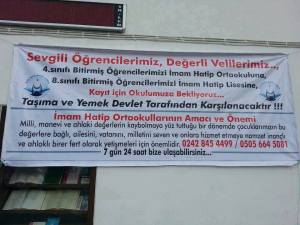18th Feb 2014 – (Reuters) – BY NICK TATTERSALL. Turkey’s president has signaled he will approve new laws tightening controls over the courts and the Internet, bolstering embattled Prime Minister Tayyip Erdogan but deepening concerns about free speech and the rule of law.
The two bills, passed by parliament this month and awaiting President Abdullah Gul’s approval, are seen by Erdogan’s critics as an authoritarian response to a corruption inquiry shaking his government, a bid to stymie court cases and to stop leaks circulating online. The new law on the judiciary will give the government more influence over the naming of judges and prosecutors, while the Internet bill will enable the authorities to block access to web pages within hours without a prior court order.The moves by Turkey, which has been seeking membership of the European Union for decades, have raised concern in Brussels, which fears it is shifting further away from EU norms, and unnerved investors in a country whose stability over the past decade has been based on Erdogan’s firm rule. The government says the laws will further democracy by taking back control of a judiciary it sees as in hock to a powerful but unaccountable cleric bent on unseating Erdogan, and by protecting individuals’ privacy on the Internet.
Police fired teargas to disperse demonstrators protesting against the Internet law in Istanbul this month, and parliamentarians debating the judicial reforms came to blows on Sunday, leaving one with a broken nose. Erdogan’s opponents have called on Gul, who co-founded the ruling AK Party with him in 2001 but is generally seen as a more conciliatory figure than the combative prime minister, to use his powers to veto the bills. Speaking to reporters on a trip to Hungary late on Monday, he gave little sign he would do so. “As the president I cannot put myself in the position of the constitutional court. But in a very general way, I can make my objections concerning the points I see,” he was quoted as saying by the Hurriyet and Haberturk newspapers.
Gul pointed out he had raised concerns about the AK Party’s first draft of the judicial reform bill, which had since been amended, and that the opposition had already indicated it would in any case appeal to the constitutional court.
“That is our tradition. Presidents before me would say ‘the constitutional court decides on the subject of laws in which there are arguments for and against’,” he was quoted as saying.
Gul has also said there are “problems” with some elements of the Internet law, which the country’s communications minister was quoted on Tuesday as saying may still be amended.
POLITICAL AMBITION
Gul has made little secret of his desire to return to mainstream politics and is seen as a future leader of the AKP, an ambition his critics say leaves him too wary of conflict with Erdogan to act as an effective check on his power.
“Gul wants to serve as president for a second term and has the desire to chair the AKP after Erdogan, so even if he does not fully agree, he is approving controversial regulations from the party,” Turkish political analyst Atilla Yesilada said in a report.The battle for control of the High Council of Judges and Prosecutors (HSYK), which appoints senior members of the judiciary, lies at the heart of a feud between Erdogan and influential U.S.-based cleric Fethullah Gulen.
Gulen, whose followers say they number in the millions, is believed to have built up influence in the police and judiciary over decades and leads a powerful worldwide Islamic movement from a forested compound in the United States. Erdogan blames Gulen, a former ally who helped cement AK Party support over the past decade, for unleashing the graft investigation, which he sees as an attempted “judicial coup” meant to undermine him in the run-up to local and presidential elections this year. The cleric denies any such role. Gul is seen as enjoying more support from Gulen’s network of sympathizers, who view themselves as pro-democratic and reformist, then Erdogan, whose views on issues from abortion to alcohol they see as unnecessary interference in private life.
But Gul has also been critical of the cleric’s influence in state institutions in recent months, appearing to close ranks with Erdogan and echoing the prime minister’s warning that a “state within the state” will not be tolerated. In the eyes of Turkey’s opposition, too weak in parliament to stall AKP bills, that opens the way for Erdogan to impose an increasingly authoritarian rule.
“If the president approves the HSYK law, the judiciary will be bound completely to the government. The separation of powers will be completely shelved,” said Devlet Bahceli, head of the opposition Nationalist Movement Party (MHP). “I fear that Prime Minister Erdogan will sit at the top of the judiciary as the chief judge.”
(Additional reporting by Asli Kandemir and Daren Butler; Editing by Robin Pomeroy)
From: http://www.reuters.com/article/2014/02/18/us-turkey-government-idUSBREA1H18Z20140218

